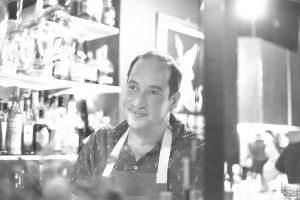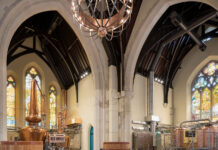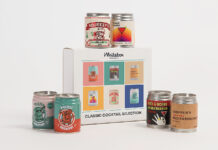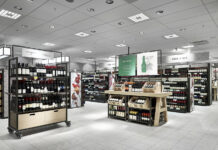
Felix Cohen is a much-needed figure in the London bar world, though web development is his “other” career. As the owner of the tiny, charming Every Cloud (everycloudbar.com) bar in London’s Hackney neighborhood (in our top bars feature, pg. 134), he also ran the Manhattans Project, a cocktail bar pop-up and event consultancy.
But Cohen is a man of multi-industry skills: he’s a full-stack web developer and consultant for an array of start-ups and agencies, from trade schools to humanitarian organizations. So it comes as no surprise that he gets “technical ” in creative house drinks, like Every Cloud’s signature Champagne Daiquiri, which contains no Champagne. Cohen created his own acid base mimicking bubbly wine.
He fell into the bar world in an unexpected way… and through a budding interest in the cocktail renaissance in the English town of Bath. Here, in his own words, Felix tells us about his path to bartending, his insider knowledge of London food and drink and how he decides what spirits to stock in his bar.
Tell us a bit about your background:
I grew up on a farm in [England’s] Midlands, the youngest of four and two older half-siblings. The farm focused on sheep, a few horses and cows for our own consumption. I went to school in a nearby town.
There wasn’t really a culture of cocktails or wine at that time where I was, though there was the first wave of alcopops and, as part of the farming community, definitely a lot of great ciders and bitters [bitter beers]. Drinking a Jack and Coke was the height of cosmopolitan behavior, and shots were almost exclusively (what I now know to be mixto) tequila and sambuca. Not an auspicious start for a cocktail bartender!
When I left home to go to university, I was amazed at the extent of drinks that were available. Bath, where I studied psychology, was (and is) a European city of romance and has many amazing cocktail bars. I was very curious about what happened in them, but didn’t have the money to be drinking cocktails at that time. I told a friend of mine that I was very curious and when she picked up a temp shift working as a waitress in a bar called (imaginatively) ‘Lounge,’ she passed my details on to the owner. I got a call in the middle of the day, turned up somewhat stoned, and was offered a trial shift.
While I studied in Bath, I got the opportunity to work in a lot of bars, from tiny neighborhood joints to sprawling clubs with amazing backbars. I loved the chance to try the spirits and liqueurs and was blessed with managers who encouraged me to try and make new drinks, [teaching] me important cocktail history and the key to balancing drinks. There were some truly awful drinks around at that time (in the early 2000s) as the cocktail renaissance was only really taking hold in London at that point, so to get a good grounding in the classics was a really lucky position.
What led you to get into the drink world?
I’ve always felt that bars, and especially cocktail bars, are the epitome of the hospitality industry. Unlike a restaurant, we’re not offering a product that is literally necessary for your body, no matter how high end it is. We’re selling a product that is absolutely available as a commodity, whether you choose to drink beer, vodka, whiskey or gin, you simply don’t need to drink it in a nice cocktail bar. The means of production we have are accessible to just about anyone (or certainly were when I started; now we’re using vacuum stills and centrifuges, so that’s not so much the case). What we’re offering as a cocktail bar is all about experience.
After my early days learning the trade and taking advantage of the fact I was working in nice bars to develop my palate on a student budget, I found myself working in digital teams in my day job, using what I had learned in my psychology degree to improve the user experience of websites. This led me to the realization that really what I loved about bars wasn’t the selling of drinks so much as the selling of experience. The music, the lighting, the chat over the bar, the napkins being right—every detail is important to give our guests an experience they will remember and which, ultimately, makes them happy. I joke that I do that wholesale for websites and digital experiences, and retail in bars, but there’s more than a grain of truth in it. I want people to finish their day in a better mood than they started it. Sometimes that means 500,000 people have a marginally more pleasant time using a website’s shopping cart and sometimes that means making someone their first Sazerac.
How does living in London influence your bar’s style and operations?
I cannot imagine a city that makes me want to make better drinks than London. It’s a meeting point of so many cultural and culinary traditions. I have access to the most amazing selections of ingredients, techniques and inspiration from the bars and restaurants around me. I can go to the best bars in the world one night, get an incredible kebab, or ramen, or bacon sandwich on the way home, wake up the next day and stand in a Victorian ice warehouse, or visit some of the largest fresh produce markets in the world.
I’m the first person in my family who’s chosen to make London my home and, while I know I won’t be here forever, this city has made me the bartender I am. It’s a mess of neighborhoods, communities, overlapping and overlaid traditions, and I love that about it. I will always hold dear the knowledge it has given me, even if I choose to go somewhere else and apply it there.
Of course, that’s all stuff you can read on any number of signs when you land at Heathrow Airport, but it’s true. London has such a long and messy history that it feels like the food and drink traditions and cultures are this amazing palimpsest. [Here], people will try and enjoy anything from pickled rice margaritas to hot cross bun Old Fashioneds.
What is your philosophy on deciding what brands to stock behind your bar?
I think the amazing multicultural layers of London lend themselves to creating exciting, novel craft brands as well as sustaining some really amazing brand and product legacies. So we go from something like Beefeater Gin, which is this incredibly high-volume, high-quality product, to products like Rebel Rabbet, which are super short run, experimental spirits drawing on historic recipes and modern techniques.
I want to keep a backbar which [allows us to] make just about any classic cocktail you can think of, but also allows me and my staff to come up with fun and interesting drinks on the fly, like any bar should be able to. Guests should be able to leave with the knowledge that there is one classic cocktail that is everything they love in a drink, which they can order in any decent bar they go to, but they should want to come back to Every Cloud because we have that one ingredient that no one else has. That said, I hate renting space on the shelves to bottles that don’t move, so if there’s something that isn’t moving, we’ll do our best to shift it in a special and it won’t be coming back on the shelf.
Having access to so many products and producers allows me to be selfish about what I stock. I like to know the people involved, I like them to be interested in what we’re doing with their products, and it’s important to me that they don’t just care about their bottom line. That doesn’t necessarily mean they need to be ultra-sustainable, organic and so on, but I want to work with people who care about the provenance of ingredients where it matters, who treat their staff and suppliers right and who want to innovate with a good reason.
How do you and your team educate customers on new and quality spirits?
We have a really strong policy of not upselling in the bar. It sounds absurd, but I think our guests know when they’re being pushed something because we want more money in the till. We want to sell people stuff because we’re excited by it, not by what it represents to the bottom line. I loved what Sager + Wilde did with wines, where they cared more about the absolute cash margin on a bottle, rather than the percentage. They made amazing wine accessible to people who would be completely put off by it at normal margins, and were also able to put it out by the glass because they were shifting enough volume to not stress about wastage.
We’re so lucky with spirits and liqueurs that wastage and spoilage isn’t such a concern. Even with fortified wines and vermouths, it’s much more manageable, so I encourage the team to showcase certain bottles that we’re excited about at any time, and we’ll often have something really special in for our industry pals.
One of our most successful initiatives has been our Miniatures Nights, however, which takes a lot of the agency out of people’s hands. We’re inundated by sample bottles of products, as I think many bars in the UK are. We’ve also got a lot of bottles around with 50–150ml left that are just taking up space on the shelf, so roughly every six months we decant all those bottles into 50-ml sample bottles, mix them up with all the samples left and put the box of bottles on the bar. We charge £6 to rummage (blind) in the box, pull out a bottle, and we’ll make up a drink with whatever the guest pulls out. That could be anything from a strawberry-milkshake-flavored bottle to a Sazerac 18 year, so it keeps us on our toes, as well as being a good reminder that the best drinks don’t necessarily come from the most expensive liquids. It’s great for brands big and small to actually get their products in consumers’ hands and heads, and it’s a very approachable way for people to learn more about cocktails.
What advice would you give to distilleries looking to be represented in quality bars like yours?
Be friendly, be supportive and stay out of the way of what we want to do with your products. I’m always excited to taste a new product, and even in the most overpopulated categories (cough, gin, cough), there are amazing new products coming out that we can’t ignore. But if you’re going to insist on a signature serve, leave me with a pile of point of sale or glassware that we can’t use more widely, then I’m going to shy away from the product. Partly that’s because we’re a small space with limited storage, but more importantly it’s because as a small venue, when we work with small producers, we want it to be a mutually beneficial arrangement. We’ll pay the premium for smaller-batch products in order to have the visibility of using something new, coming up with exciting serves that wouldn’t be feasible for larger operations and an aura of exclusivity. You’ll [the distiller] get to shout about how hip, exciting venues are using your products in awesome ways.
What are some micro-distillers that are exciting you right now?
We’ve been long-term fans of the team at Victory, who started out with a fantastic gin that’s been on our menu in a rosehip, hop and hay Collins cocktail served almost since we opened. [They] have recently come out with a vodka with the slightest hint of green coffee bean that has me excited about that white spirit for the first time in a long time. Their bitter is also pretty brilliant.
Square Root soda, who were just down the road from us but are moving to a bigger site currently, make some of the best sodas and mixers I’ve ever had, and always in a very mindful, fruit-to-bottle way. They’re always up for a great collaboration, whether with us or any of the amazing brewers and distillers around the area.
Rebel Rabbet, and the London Distillery Company in general, are good friends. I’m unbelievably excited to see where they end up and what their product range becomes. Experimenting in public like they are is a joy to watch.
Further afield, we’re looking to work with the Borders Distillery, especially their Kerr’s Gin, in the near future. It’s brilliant to see new London whiskey finally making it to the market. We’ve worked tightly with the team at Maverick since the early days. It’s incredible to see how far they’ve come and how the brands that were very small-batch when I started making drinks at the Manhattans Project are now established in the landscape of the industry.
Category-wise, I’m desperate to see more botanical spirits emerge that aren’t using juniper as their base note. ‘Gin’ on a label sells drinks, but as people explore the category more and more, it’s becoming clearer that at some point we’re going to be able to make new categories that don’t rely on that particular berry, as delicious as it is. I’m also keen to see people experimenting with different fermentation bases, pulling in fruits, vegetables and unusual grains, letting the character of them stand out with fewer distillations, less filtration and clarifications. But, then, I do love my cider cloudy and my corn whiskey out of a jug, so that may just be my palate.
Besides your bar, what do you think are some “can’t miss” food and drink spots when people are visiting your city?
Of course, my business partners have their restaurant Silver Lining next door to us, and that’s definitely a can’t miss. Further afield, anything that Max and Noel Venning have touched is a definite, so Three Sheets, Bar Three and Little Mercies are all fantastic. Michael Sager’s venues are impeccable, and Marcis Dzelzainis’s cocktail programs are just unreal. Similarly, Ryan Chetiyawardana’s venues are deservedly covered in award plates—it’s always exciting to see what he’s up to.
For a great pint and atmosphere, our local pub the Chesham Arms is fantastic. Local brewery Deviant and Dandy also deserves a shout-out, as does Five Points and their great updating of the Pembury Arms.
For food, I love Tonkotsu for ramen, Patty & Bun for burgers, Mestizo for Mexican food. I can’t wait to see what the team from [recently closed] Legs get up to next. Pidgin, and their sister restaurant in central London, Magpie, are both brilliant. You can’t beat the barbecue duck at Four Seasons in Chinatown or kebabs from Mangal 2 in Dalston. I’ll never tire of just taking my trips to Ridley Road and getting warm onion bhaji and bags of £1-a-bowl fruit and veg to cook with at home.








